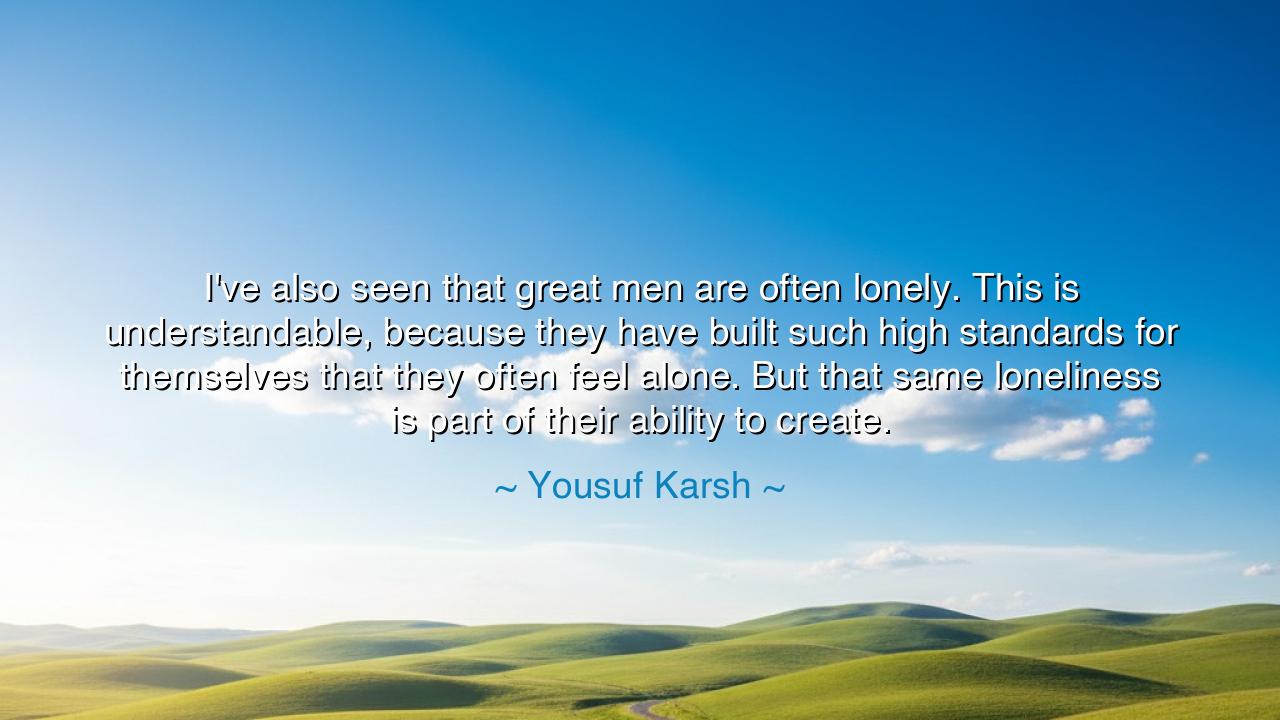
I've also seen that great men are often lonely. This is
I've also seen that great men are often lonely. This is understandable, because they have built such high standards for themselves that they often feel alone. But that same loneliness is part of their ability to create.






Yousuf Karsh imparts a powerful truth when he states, "I've also seen that great men are often lonely. This is understandable, because they have built such high standards for themselves that they often feel alone. But that same loneliness is part of their ability to create." In these words, Karsh reveals a deep paradox of greatness. Those who rise to greatness, whether in art, leadership, or any field of human achievement, often find themselves in solitude. The reason is clear: they have set such high standards for themselves, a vision so distinct and a goal so noble, that they feel isolated from others who do not share their exacting demands. This loneliness, however, is not a curse but a necessary part of the creative process. In their solitude, these individuals can focus, reflect, and reach a depth of insight and innovation that the crowd cannot.
In ancient times, this loneliness of greatness was well understood. The Greek philosophers, particularly Socrates and Plato, often spoke of the burdens of wisdom and the loneliness that accompanies those who seek the truth. Socrates, in his relentless quest for knowledge and his refusal to accept anything less than the highest standard of virtue and understanding, was often isolated. His philosophy was alienating to many of his contemporaries, yet it was precisely this detachment from the world that allowed him to question, to think, and to create a body of thought that would influence humanity for millennia. Socrates’ isolation was the price of his greatness, and in his loneliness, he found the freedom to create new ideas that reshaped the ancient world.
The loneliness of great men is a theme that runs through the epic stories of legendary figures. Consider Leonardo da Vinci, whose genius in art, science, and invention set him apart from his contemporaries. Though he was surrounded by patrons and apprentices, da Vinci was, in many ways, profoundly alone. His innovations were so far ahead of their time that he could not always find those who shared his vision. He set a standard for creativity so high that his solitude became a natural consequence of his ability to think beyond the limits of his era. Da Vinci’s loneliness allowed him the space to experiment, to innovate, and to bring forth ideas that would change the world. His life exemplifies the truth that loneliness, while painful, can also be a catalyst for great creation.
Similarly, Michelangelo, the master sculptor and painter, is another figure whose greatness was intertwined with a life of solitude. His works, from the David to the ceiling of the Sistine Chapel, are considered the pinnacle of human artistic achievement. Yet, Michelangelo’s life was often marked by deep personal loneliness. He spent years working in isolation, creating masterpieces that would forever change the course of art, but he struggled with a sense of disconnection from others. The standard he set for himself, his obsession with perfection, isolated him from friends and colleagues. Yet, it was precisely this solitude that gave him the time and space to create art that transcended human limits and endures to this day.
The loneliness that Karsh describes is not just the result of high standards but of a deeper calling, a mission that requires sacrifice and often leads one away from the world. Consider the life of Mahatma Gandhi, a man whose vision of a free India and commitment to non-violence were so consuming that they isolated him from the political and personal worlds around him. Gandhi's standards for himself were incredibly high—his commitment to truth, non-violence, and self-reliance were not just political ideals, but ways of life. His dedication to these principles often led to loneliness, as few could fully understand or share his vision. Yet, it was in his solitude, in the deep reflection on his ideals, that he developed the strategies that led India to independence. Gandhi’s loneliness fueled his creativity and his ability to inspire millions to follow his non-violent path.
The lesson here is profound: greatness is often the result of solitude and loneliness, but it is in this very solitude that the most profound creations emerge. Loneliness is not something to be feared, but rather embraced as an integral part of the creative journey. Great men set high standards, not just for their work but for their lives, and this pursuit often leads them away from the comfort of community. Yet, this detachment is not the end but the beginning of something greater—a deeper connection to truth, vision, and the power to create that which will endure long after they are gone.
Therefore, I urge you, dear reader, to embrace solitude when it comes. Understand that it is not a punishment but a necessity for those who seek to leave a legacy, who wish to create something that will outlast their own lifetime. If you are striving toward greatness in any area of life, know that loneliness may come as part of that pursuit. It is in these moments of isolation that your creative power will be nourished, and it is through your dedication to your highest ideals that you will bring forth the contributions that will change the world. Do not fear loneliness, but rather seek the courage to be alone, for it is in that solitude that you will discover the power to create something immortal.






AAdministratorAdministrator
Welcome, honored guests. Please leave a comment, we will respond soon